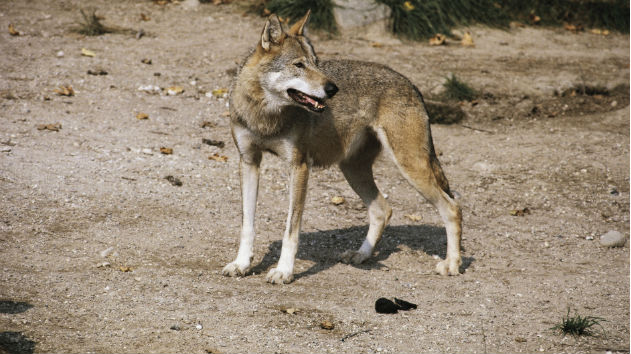Four Wolves Killed in First Two Days of Controversial Michigan Hunt
Published at | Updated at
 DEA / A. CALEGARI/De Agostini/Getty Images(LANSING, Mich.) — Four wolves have been killed in the first two days of a controversial wolf hunting season that began in Michigan on Friday, a wildlife official has confirmed.
DEA / A. CALEGARI/De Agostini/Getty Images(LANSING, Mich.) — Four wolves have been killed in the first two days of a controversial wolf hunting season that began in Michigan on Friday, a wildlife official has confirmed.
Three wolves were killed on the first day of the hunt and another on Saturday in two of the three areas of the Upper Peninsula where the Michigan Department of Natural Resources have approved the culling of 43 gray wolves.
“Our hunt is specifically designed around chronic conflict between wolves and humans where other methods of resolution were not successful,” DNR spokesman Ed Golder said. “We have had 101 cases of fearless behavior, 65 percent of those were able to confirm through site visits. We are trying to be proactive in our approach.”
The hunt is the first allowed in the state since the gray wolf was listed as an endangered species almost 40 years ago.
The DNR has granted 1,200 hunters licences to kill wolves with firearms, crossbows or bow and arrows on public and private lands until Dec. 31, or until the target number is reached.
“The hunt may also change behavior of wolves in the hunt units — making them more wary of people, residential areas and farms — and reduce the abundance of wolves in these management areas that have experienced chronic problems,” the DNR said in an earlier statement.
Virtually extinct in the lower 48 states in the 1950s, gray wolves have made a dramatic comeback, leading the U.S. Fish and Wildlife Service to delist wolves from the Endangered Species Act protection in January 2012.
There are now an estimated 2,211 wolves in Minnesota and a total of 1,467 in Wisconsin and the Upper Peninsula of Michigan. Since wolves were reintroduced in Yellowstone National Park, there are now more than 1,500 wolves in Wyoming, Idaho and Montana.
“We made the right choice to … bring these animals back from the brink of extinction,” Interior Secretary Bruce Babbitt said when he announced that the animals have rebounded enough to warrant their reclassification in virtually all of the country.
The Mexican gray wolf is still considered endangered — and therefore is under strict protections — in southern Arizona, New Mexico and Texas, where efforts to increase the numbers of a rare subspecies have stumbled.
Michigan is the sixth state that has sanctioned wolf hunting since the species’ removal from the endangered list.
Some conservation groups said the reclassification would lift protection too soon, before the species has re-colonized large sections of its old range. Ranchers and others who complain the animals routinely kill livestock and pets, countered that the laws protecting the wolves unfairly limited the rights of property owners.
Golder said DNR had received some opposition from groups such as the Keep Michigan Wolves Protected, an offshoot of the Humane Society of the U.S., which previously gathered 255,000 signatures statewide to place the wolf hunt decision before Michigan voters in a referendum. They were ultimately unsuccessful.
But other groups, he said, strongly supported the hunt, including the umbrella group the Michigan United Conservation Clubs, who state on their website that “Conservation — not preservation — is the goal.”
Neither group responded to calls from ABC News.
The DNR says the target harvest is not expected to hurt the state’s currently estimated 658-strong gray wolf population.
The bag limit is one wolf per person during the season, and successful hunters must report the kill to the DNR and present the carcass to a one of five check stations within 72 hours, where the animal’s pelt will be sealed, one tooth removed, and reproductive tracts from females collected.
Copyright 2013 ABC News Radio


